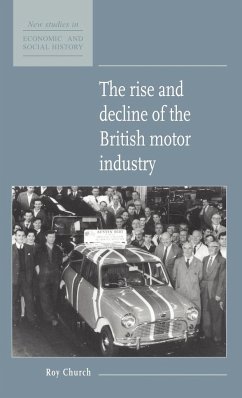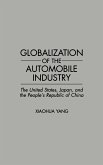The decline of the British motor industry is one of the most spectacular developments in Britain's economic history. Conflicting explanations have been offered by scholars from different disciplines to produce a complex debate, which this new study attempts to unravel. Placing the industry firmly in a European context, Roy Church re-examines the critical assessment of the achievements of the industry both before and after the onset of its decline in the 1960s, and goes on to test the various explanations which have been offered to account for this decline. He examines the role of government, of the trade unions, of management and of the multinationals, each of which has been seen as a major player in the demise of the British-owned industry. This concise and lucid review of the debate will be invaluable to students of modern British and European economic history.
Table of contents:
Acknowledgements; Themes; Part I. The Origins of British Pre-eminence in Europe: 1. The rise of the British motor industry before 1914; 2. War and its aftermath: gains and losses; 3. The framework of protection: demand at home and overseas; 4. Fordism and the British system; 5. The dynamics and limitations of 'personal capitalism'; 6. Fordism and the British approach to markets and marketing; 7. Debilitating environment: structures and strategies; Part II. The Roots of Decline: 8. postwar pre-eminence: attainment and erosion; 9. Private investment and public policies: government and industry; 10. Manufacturing systems; management and labour; 11. The role of organised labour: strikes and productivity; 12. Industrial relations: Fordism and post-Fordism; 13. Fordist structure and strategy: the managerial organisation; 14. Industrial structure, organisation and corporate culture: the origins and performance of BMC; Part III. The Vicissitudes and Collapse of a 'National Champion'; 15. Anatomy of a merger: the rise of British Leyland; 16. The effects of merger; 17. British Leyland's productivity dilemma: markets and productivity; 18. The nationalised champion: policies and personalities; 19. From nationalisation to privatisation; 20. Globalisation and the role of multinationals; 21. Explaining decline; Bibliography; Index.
This book is a concise and lucid review of the strengths and weaknesses of the British motor industry since its formation. Placing the industry firmly in a European context, the author assesses its achievements before 1960, and tests the various explanations which have been offered to explain its decline in the last thirty years.
A concise review of the strengths and weaknesses of the British motor industry during the one hundred years since its foundation.
Hinweis: Dieser Artikel kann nur an eine deutsche Lieferadresse ausgeliefert werden.
Table of contents:
Acknowledgements; Themes; Part I. The Origins of British Pre-eminence in Europe: 1. The rise of the British motor industry before 1914; 2. War and its aftermath: gains and losses; 3. The framework of protection: demand at home and overseas; 4. Fordism and the British system; 5. The dynamics and limitations of 'personal capitalism'; 6. Fordism and the British approach to markets and marketing; 7. Debilitating environment: structures and strategies; Part II. The Roots of Decline: 8. postwar pre-eminence: attainment and erosion; 9. Private investment and public policies: government and industry; 10. Manufacturing systems; management and labour; 11. The role of organised labour: strikes and productivity; 12. Industrial relations: Fordism and post-Fordism; 13. Fordist structure and strategy: the managerial organisation; 14. Industrial structure, organisation and corporate culture: the origins and performance of BMC; Part III. The Vicissitudes and Collapse of a 'National Champion'; 15. Anatomy of a merger: the rise of British Leyland; 16. The effects of merger; 17. British Leyland's productivity dilemma: markets and productivity; 18. The nationalised champion: policies and personalities; 19. From nationalisation to privatisation; 20. Globalisation and the role of multinationals; 21. Explaining decline; Bibliography; Index.
This book is a concise and lucid review of the strengths and weaknesses of the British motor industry since its formation. Placing the industry firmly in a European context, the author assesses its achievements before 1960, and tests the various explanations which have been offered to explain its decline in the last thirty years.
A concise review of the strengths and weaknesses of the British motor industry during the one hundred years since its foundation.
Hinweis: Dieser Artikel kann nur an eine deutsche Lieferadresse ausgeliefert werden.








